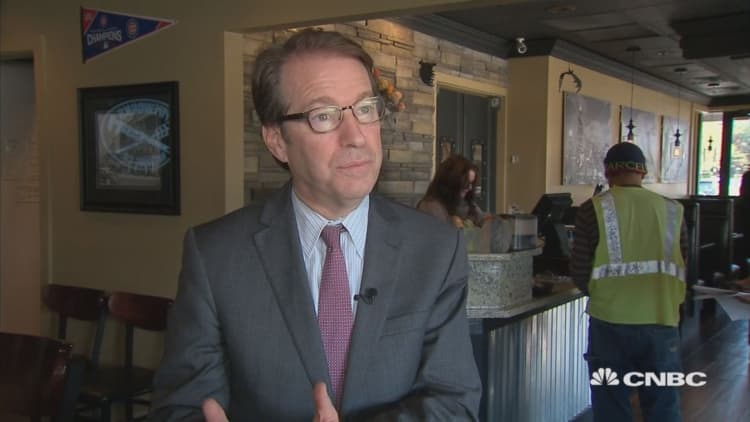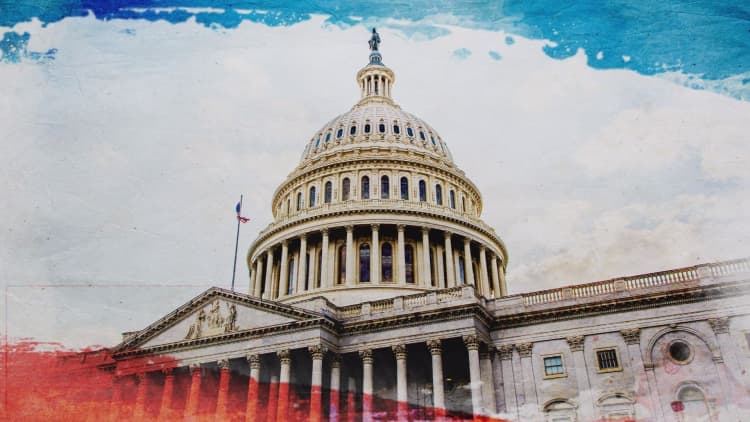
DOWNERS GROVE, Ill. — Rep. Peter Roskam has spent months preaching the benefits of Republicans' $1.5 trillion tax cut to voters in his suburban swing district just outside of Chicago.
Roskam, a chief architect of the sweeping new law, argues it has jump-started economic growth. He credits the tax cuts with replenishing Medicare's health insurance fund, galvanizing manufacturing in his district and spurring companies to hire more workers.
But there's one thing they may not be able to do: save his own job.
"This race is close because we're in a tumultuous season in our public life," Roskam said in an interview with CNBC.
The tax cuts were supposed to be the centerpiece of the Republican campaign in the midterm elections. Instead, the GOP's singular legislative achievement has been overshadowed by trade tensions, the fight over the Supreme Court and President Donald Trump's Twitter feed.
Now Roskam is on the front lines of the battle for control of Congress. The voters in his district are affluent, well-educated — and, along with moderates suburbs like this one across the country, starting to lean to the left.
A recent poll shows Roskam slipping behind his Democratic opponent, political newcomer Sean Casten. Outside liberal groups are funding a late-stage ad blitz, and Casten announced one of the largest fundraising hauls of any congressional race during the third quarter.
"No one would've thought that Peter Roskam would be in any trouble," said Kyle Kondik, managing editor of Sabato's Crystal Ball, a political newsletter published by the University of Virginia's Center for Politics. "But Trump taking over the Republican Party … has had negatives in some places, too, and this district is a prime example."
Split over the tax cuts
The first punch in the new attack ad is aimed squarely at the GOP tax cuts.
"Peter Roskam needs a checkup," an ominous voice intones. "He voted for the Trump tax plan that increased health care premiums up to $1,500 and adds $1.9 trillion to the national debt."
The ad is part of a massive $1.9 million TV ad campaign by the House Majority PAC that is in heavy rotation in the run-up to Election Day. This week, Casten released his own ad tying Roskam's work on the tax plan to Trump and potential cuts to health care.
Nationally, the tax cuts remain aren't polling well. About 46.5 percent overall oppose the measure, compared with 42.5 percent who support it, according to Civis Analytics, which tends to work with Democrats.
But support is stronger here in Illinois' 6th Congressional District. Civis found about 45 percent of residents approve of the new tax law — the same percentage who oppose it.
"People pay a lot of taxes in this district," said Casey Caballero, a volunteer for Casten. "There's a fear on the part of a lot of people that voting for a Democrat means voting for a tax increase or additional tax burden. In this case, we are out here arguing to people that that's not true."
Casten's campaign is honing in on a controversial provision in the new tax law that caps the deduction households can take for paying state and local taxes at $10,000. The measure mostly hit high-tax districts in New York and New Jersey — Republican congressmen from those districts voted against the law —but affluent neighborhoods with high property values like Roskam's are also feeling the squeeze.

Roskam's campaign counters that lower overall tax rates combined with the elimination of the alternative minimum tax means most households in his district will enjoy a tax break this year. He estimates the new law will save residents here nearly $1 billion.
"I think most folks in this constituency are interested in tax relief," Roskam told CNBC. "They're not particularly concerned about the equation by which that tax relief comes to them. But there's real tax relief there."
All about Trump
There's a lot in the new tax law that would have benefited Casten, a former businessman who ran a clean energy start-up. But that's doesn't mean the tax plan was a good idea, he said.
"You're not supposed to be running huge deficits when unemployment is at lows, and we're in a nine-year economic boom," Casten told CNBC. "And we're at that point because we basically put fuel on the fire of a booming economy."
If elected, Casten said he would vote to repeal the new tax law. Climate change is another signature campaign issue. But Casten said his top priority would be protecting special counsel Robert Mueller's investigation into Russian meddling in the 2016 presidential election.
For Casten — and an energized Democratic base — the midterms are about taking down Trump.
"I would vote for a Republican if they distanced themselves a little bit from the Trump administration, but they haven't, which was perplexing," said Natalie Doak, a local mom who said she plans to vote for Casten.
Voters in these suburbs have long swung between parties. Roskam won his seat in 2006 in a come-from-behind challenge to Tammy Duckworth, a Democrat who now sits in the Senate. The district went for Republican presidential candidate Mitt Romney over President Barack Obama in 2012. But former Secretary of State Hillary Clinton bested Trump here by 7 percentage points in 2016.
Roskam points out that he has pushed back against several controversial White House policies: the tariffs on steel and aluminum and Chinese goods, the lowering of refugee levels and changes to protections for people with disabilities. In recent weeks, his campaign has also begun highlighting efforts to reach across the aisle and framing his six terms in office as evidence of his effectiveness in Washington.
"What you're seeing are common-sense people that are not interested in drama," Roskam told CNBC. "The bipartisan approach is something that this district is really interested in."
Roskam has accused Casten of adopting what he calls the "politics of ridicule" and launched an ad this week featuring Republican women reading his tweets. Casten was forced to apologize for equating Trump to terrorist mastermind Osama bin Laden. But he said he's not sorry for his harsh rhetoric.
"If you've been given a public pulpit, you have to speak truth to power," Casten told CNBC. "And if that makes my opponent uncomfortable, that's for him to deal with."
Several prominent political analysts are predicting that Casten will come out ahead in November. A poll this month commissioned by Casten's campaign showed him leading by 5 percentage points, 49 to 44 percent. But a September survey by The New York Times showed the two candidates neck and neck.
If Roskam is able to hold onto his seat, he said, he's prepared to work across the aisle if his party loses power.
"There's no question," the Republican told CNBC. "I've done it in the past. And I'll be able to do it again in the future."



